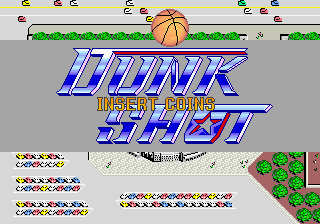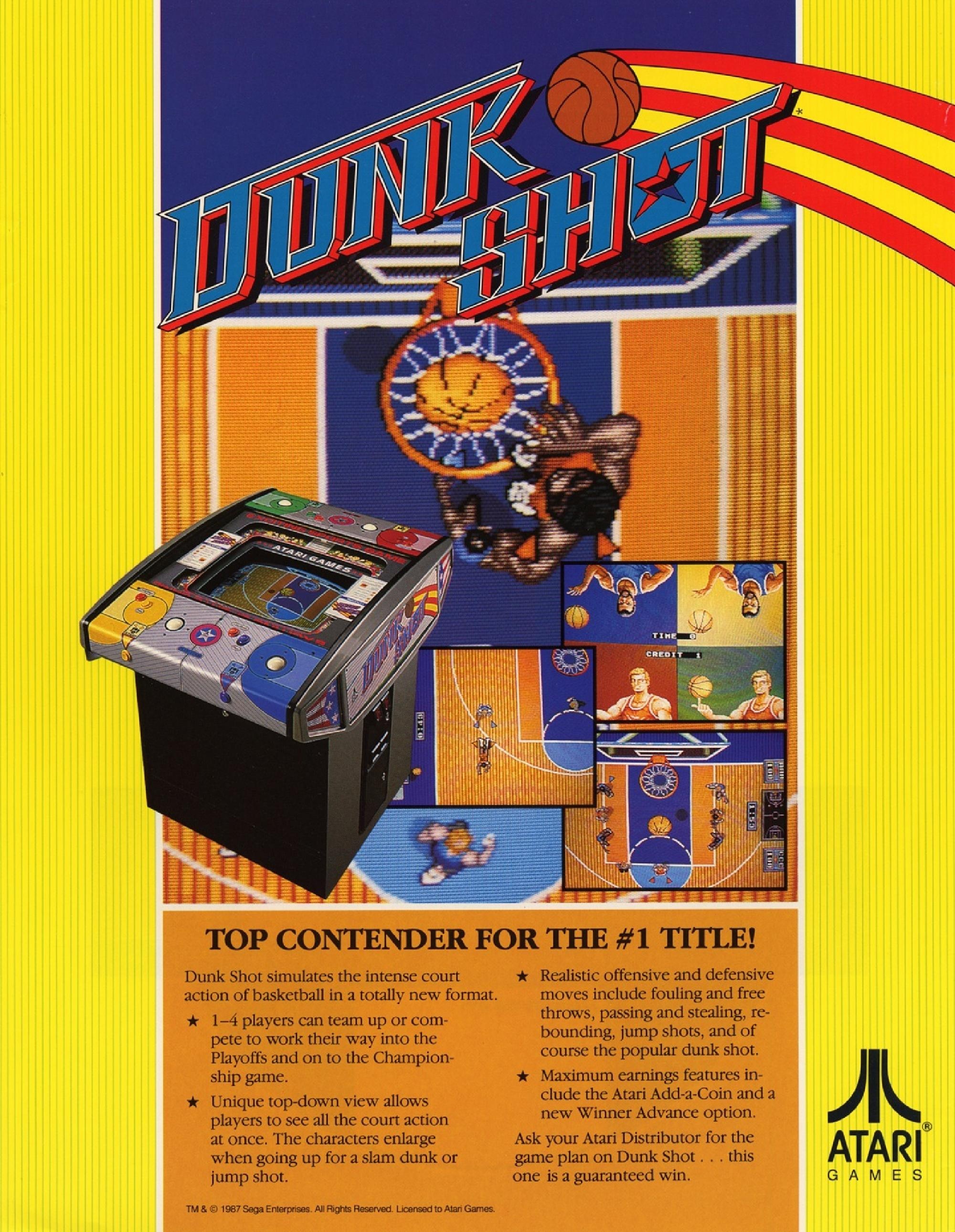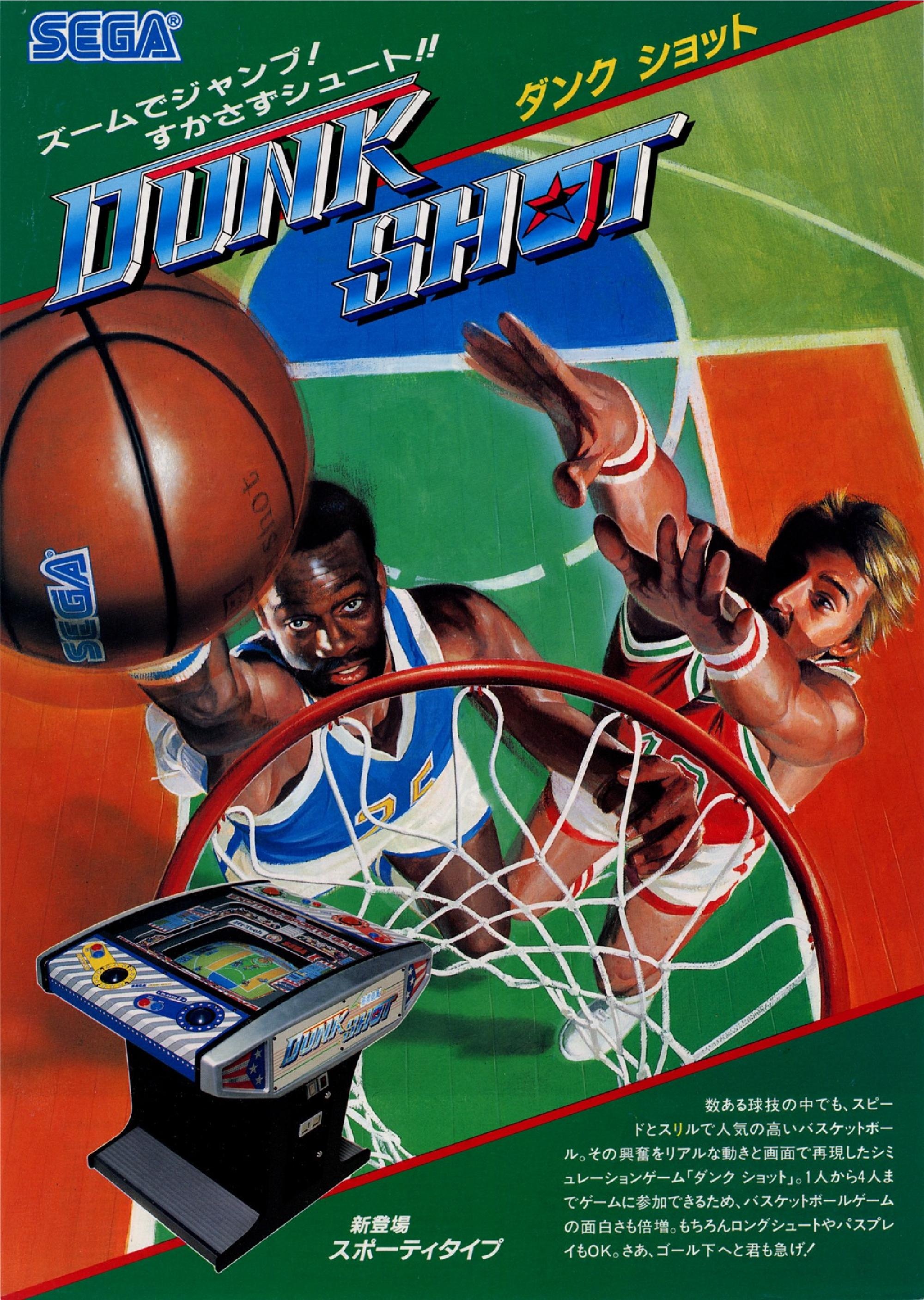Dunk Shot
From Sega Retro
| Dunk Shot | |||||||||||||||||
|---|---|---|---|---|---|---|---|---|---|---|---|---|---|---|---|---|---|
| System(s): Sega System 16B | |||||||||||||||||
| Publisher: Sega Enterprises, Ltd. (JP), Atari Games (US) | |||||||||||||||||
| Developer: Sega R&D 1 | |||||||||||||||||
| Genre: Sports | |||||||||||||||||
| Number of players: 1-4 | |||||||||||||||||
|
This teeny-tiny article needs some work. You can help us by expanding it.
Dunk Shot (ダンクショット) is a top-down basketball arcade game released for Sega System 16B hardware by Sega in 1987. It was licensed to Atari Games for release in the United States.
According to Atari, they sold 556 arcade cabinets in the United States for $2495 each.[3] This adds up to arcade cabinet sales revenue of $1.4 million, or $3.01 million with 2014 inflation, in the United States.
Contents
Gameplay
Dunk Shot is rendered in a top-down view where players can move in all directions using the track-ball controller, with the sprites enlarging to simulate bouncing balls and jumping characters, the latter of which is performed with the shoot/jump button.[4] A mini map of the entire court is displayed where all moving characters can be tracked, mainly for being aware of off-screen characters' positions.
Rounds last a pre-determined amount of time (which can be adjusted in the test menu)[4] and are won by whoever has the highest score when time runs out. In a one-player game or co-operative two-player game, the computer player team will start with a higher score than the human player team and the game scales difficulty by increasing this starting score by 2 each round.[5][6]
During the coffee break scenes, characters from Pengo, Doki Doki Penguin Land, Quartet, Ninja Princess and Flicky can appear.[5][7]
Production credits
- ITO
- Artist: Eiro Nagata (NAG)
- TAK
- Designer: Makoto Oshitani[8] (OSH)
- TAK
- ESI
- NOB
- ORU
- Music: Tohru Nakabayashi[10]
Soundtrack
The soundtrack of Dunk Shot was included in the CD release of Sega Game Music Vol. 3 After Burner, but was excluded the cassette and vinyl releases. It was later included in a rerelease of said CD, as well as Sega System 16 Complete Soundtrack Vol. 1. Two themes, "Beat Away" and "Toast!", were arranged as name entry jingles in the Sega Saturn port of Daytona USA.
The music has been credited to Tohru Nakabayashi by Yosuke Okunari's comments in Sega System 16 Complete Soundtrack Vol. 1 and Sega System 24 Sound Collection.
Sega Game Music Vol. 3 After Burner contains composer commentary about the development of the music. It says that the designer wanted the game to have a variety of background music, which Nakabayashi then agonized over as many of his compositions were deemed "nothing special" or "not unique". He would optimistically listen to music in several different genres and imitate them, before abandoning the half-finished songs for not fitting the game, then copying another genre with the results repeating, all the while the deadline drew closer.[11]
Despite the stressful development, the soundtrack was finished comfortably and included 5 satisfying themes for gameplay and several smaller themes for other uses. However, Nakabayashi asked that listeners not overanalyze the songs for any phrases which may have been taken from existing music.[11]
Magazine articles
- Main article: Dunk Shot/Magazine articles.
Promotional material
Physical scans
References
- ↑ Mega Drive Fan, "May 1992" (JP; 1992-04-xx), page 103
- ↑ http://flyers.arcade-museum.com/flyers_video/electrocoin/222001801.jpg
- ↑ http://www.atarigames.com/pdffiles/productionnumbers.pdf
- ↑ 4.0 4.1 File:DunkShot System16 US Flyer.pdf
- ↑ 5.0 5.1 Sega Arcade History, Enterbrain, page 90
- ↑ https://www.youtube.com/watch?v=X3oqZrlNh8I
- ↑ https://www.youtube.com/watch?v=KzjWiB5FsSw
- ↑ File:SS16CSTV1 Album JP Booklet.pdf, page 10
- ↑ https://youtu.be/ooM0Hl42Pq0?t=27
- ↑ File:SS16CSTV1 Album JP Booklet.pdf, page 11
- ↑ 11.0 11.1 File:SGMV3AB CD87 JP Booklet.pdf, page 7




